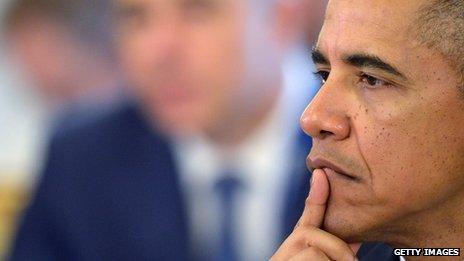Obama: US cannot ignore Syria chemical weapons
- Published
- comments

President Obama has acknowledged he faces an uphill battle to win congressional backing for a military strike against Syria
President Barack Obama has said the US cannot "turn a blind eye" to the use of chemical weapons in Syria.
He was speaking after returning to the US from a G20 summit in Russia, which failed to produce international agreement on military action in Syria.
The US accuses President Bashar al-Assad's forces of killing 1,429 people in a poison gas attack on 21 August.
EU foreign ministers say there should be no action before the UN reports back on chemical weapons attacks in Syria.
Mr Obama faces a tough week of trying to persuade Congress to authorise military action.
He will also seek public support in a White House address on Tuesday.
Mr Assad and his ally President Vladimir Putin of Russia blame rebels for the attack.
In a radio and internet address, Mr Obama said he understood that the American people were "weary after a decade of war" and insisted this would not be an "open-ended intervention" akin to the wars in Iraq and Afghanistan.
"But we are the United States of America. We cannot turn a blind eye to images like the ones we've seen out of Syria.
"Failing to respond to this outrageous attack would increase the risk that chemical weapons could be used again, that they would fall into the hands of terrorists who might use them against us, and it would send a horrible signal to other nations that there would be no consequences for their use of these weapons.
"All of which would pose a serious threat to our national security."
Any action, President Obama said, would be "limited both in time and scope - designed to deter the Syrian government from gassing its own people again and degrade its ability to do so".
G20 deadlock
Russia restated its opposition to any strike at the G20 summit in St Petersburg, with Mr Putin warning that military intervention would destabilise the region.
Both Russia and China, which have refused to agree to a UN Security Council resolution against Syria, insist any military action without the UN would be illegal.
President Obama has only a few days to convince Congress, which returns from its summer recess on Monday.
Both the Senate and House of Representatives could vote on the Syrian issue as early as next week.
Mr Obama has acknowledged that he faces a "heavy lift" to win congressional backing.
A poll commissioned by the BBC and ABC News suggested more than a third of Congress members were undecided whether or not to back military action - and a majority of those who had made a decision said they would vote against the president.
Many remain concerned that military action could draw the US into a prolonged war and spark broader hostilities in the region.
'Prepared for action'
In Europe for a four-day visit, US Secretary of State John Kerry met his French counterpart, Laurent Fabius, in Paris and both men spoke of their determination to respond to the use of chemical weapons in Syria.
Mr Kerry said the US and France were not talking about going to war, but discussing limited military action, aimed at degrading the Syrian authorities' ability to use chemical weapons.
Repeating a phrase he used earlier in the week, he said the international community was facing a "Munich moment" - a reference to the policy of appeasement that failed to stop Nazi Germany in the 1930s.
US Secretary of State: "We are very grateful for the statement that came out of the meeting today with respect of Syria"
It was not, he said, the time to allow unfettered use of some of the most heinous weapons on Earth.
"There are a number of countries, in the double digits, who are prepared to take military action," he added. "We have more countries prepared to take military action than we actually could use in the kind of military action being contemplated."
Earlier, in the Lithuanian capital Vilnius, he welcomed a statement on Syria by EU foreign ministers who were meeting there.
The EU ministers issued a statement saying that the available intelligence "seems to indicate strong evidence that the Syrian regime is responsible for the attack".
While calling for a "clear and strong response", the ministers said that the crisis in Syria should be addressed "through the UN process" and said they hoped UN investigators could issue their preliminary report on the attack as soon as possible.
They said they welcomed French President Francois Hollande's call to wait for this report before taking any further action.
Mr Kerry welcomed the EU's "strong statement about the need for accountability". A senior US state department official who attended Mr Kerry's meeting with the ministers said Mr Kerry had made clear the US had not made any decision to wait.
The US secretary of state is due to meet Arab League representatives in Paris before travelling to London for further talks with UK Foreign Secretary William Hague.
Some 100,000 people have died in the two-and-a-half-year-old Syrian conflict, according to the UN.